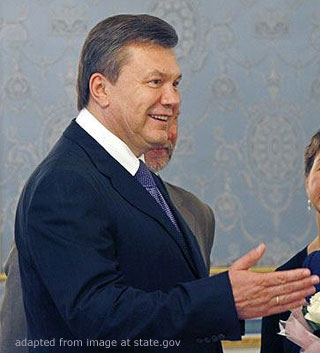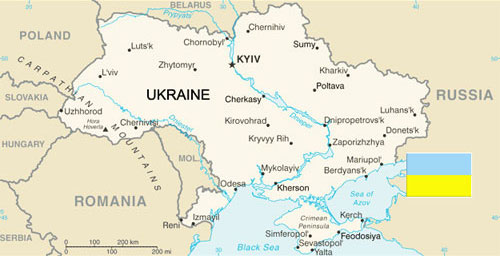Controversial Year for Ukraine: President Yanukovych Makes U-turn to Avoid Default

(Eurasia Daily Monitor: Volume 11, Issue 3 – Jamestown Foundation – jamestown.org – Oleg Varfolomeyev – January 8, 2014)
Ukrainian President Viktor Yanukovych made a sensational U-turn last year, choosing Russian economic assistance over an association and free-trade deal with the European Union. The decision, which triggered the most massive anti-government protests since 2004, was dictated by a dismal state of the Ukrainian economy and by Yanukovych’s desire to be re-elected to a second term in 2015. In any case, Kyiv’s choice in favor of Russia does not look final. Yanukovych may return to the negotiating table with the EU as Ukraine has not joined the Russia-led Customs Union.
The year 2013 was successful for Yanukovych. He managed to improve relations with Russia and, despite the U-turn in NovemberDecember, also with the EU. While EU leaders shunned him early in the year, demanding that he release political prisoners and conduct serious reforms before any serious talks could take place, by the end of November they were willing to sign the association deal with him even if his main political opponent, former prime minister Yulia Tymoshenko, remained in prison.
The attitude to Kyiv started to change in the West in April, when Yanukovych pardoned an ally of Tymoshenko’sformer interior minister Yury Lutsenko. And Western leaders began to sympathize more with Kyiv last summer, when Moscow began to openly discriminate against Ukrainian imports and made it clear that Kyiv was being punished for its pro-European course (see EDM, July 31, September 3, 2013). Eventually, the opposition and Yanukovych’s team came to terms on EU-related issues in parliament and began to pass legal acts required by the EU for the association deal. As a result, by the Eastern Partnership summit in Vilnius on November 2829, the EU was more ready to accept the deal with Ukraine than ever before.
However, the EU had been slow to notice a change in the mood in Kyiv in the fall of 2013 and seemed too inattentive to Kyiv’s calls for economic assistance. Moscow did scare Kyiv by a week-long blockade of Ukrainian imports in August and by the informal bans on the imports of railroad cars, steel pipes, and candies introduced by Moscow last summer and early fall. Furthermore, Russia, which remains Ukraine’s main trading partner, threatened that it would not respect a free-trade agreement with Ukraine if the deal with the EU were signed (Vesti, August 21, 2013).
The situation was exacerbated by rising current-account and fiscal deficits; the economy did not rebound in the third quarter of 2013 as the government had expected. In the meantime, the central bank was spending more dollars from its reserves to stabilize the local currency, while repaying debt to the International Monetary Fund (IMF). Ukraine was quickly nearing a default, as Prime Minister Mykola Azarov acknowledged recently (Interfax-Ukraine, December 13, 2013). The government hoped that the EU and the United States would help it persuade the IMF to issue a new loan of about $15 billion, but the IMF refused to ease its conditions, demanding domestic gas price hikes in order to reduce the fiscal deficit, a wage freeze, and a devaluation of the hryvnia (Ukrainska Pravda, January 5).
Ukraine would have probably benefited in the medium to long term if it accepted those conditions, but accepting them would have been tantamount to a political default for Yanukovych. He would most likely lose re-election in 2015 if the IMF’s conditions had been accepted. So from Yanukovych’s point of view, he had no option but the U-turn at the Vilnius summit, for which Moscow rewarded him on December 17 with a promise of $15 billion in loans and a price cut to $268.5 per 1,000 square meters of natural gas from around $400 charged in 2013.
However, bridges to Europe have not been burnt. First, even after the U-turn, EU leaders insist that the association deal offer remains on the table (Interfax, November 25, 2013; ITAR-TASS, December 18, 2013). Second, although accepting Russia’s assistance, Yanukovych has not agreed to join the Russia-led Customs Union, after which a free-trade agreement with the EU would have been definitely off the agenda. Third, the U-turn has prompted the most massive street protests since the Orange Revolution of late 2004. The tens of thousands of Ukrainians who have gathered in central Kyiv every Sunday starting from December 1 are probably a convincing emotional argument for those EU politicians who have been skeptical about the deal with Ukraine. The protesters initially demanded that the government return to the negotiating table with the EU, and became anti-government-minded only after police tried to disperse them by force.
Azarov reiterated after his most recent visit to Moscow that the government was not going to revise the conditions of the planned deal with the EU. He also made it clear that Kyiv would not have refused to sign the deal, had the circumstances been different (Interfax-Ukraine, December 25, 2013). The year 2014 will show if Ukraine and the West can understand each other better and if the government is serious about not changing its pro-EU course. However, it is not yet clear what exactly Yanukovych promised Russia in return for the assistance. And if Russia promised support in the upcoming presidential election, the deal with the EU will be postponed at least until after spring 2015. On the upside, the December 17 deal with Russia should help the government to stabilize the economy in the short term.

